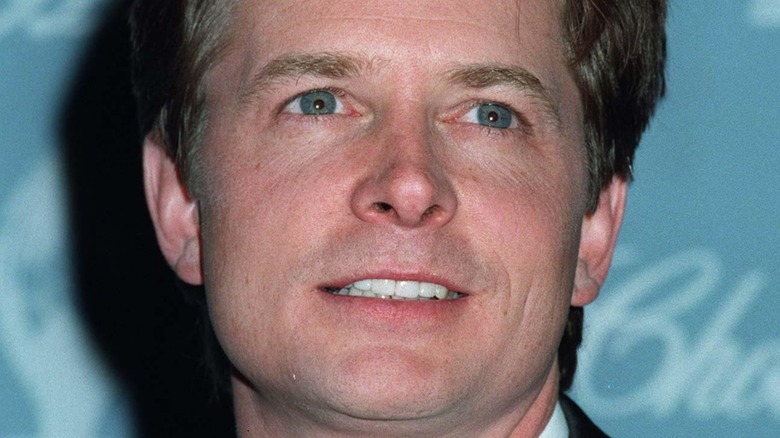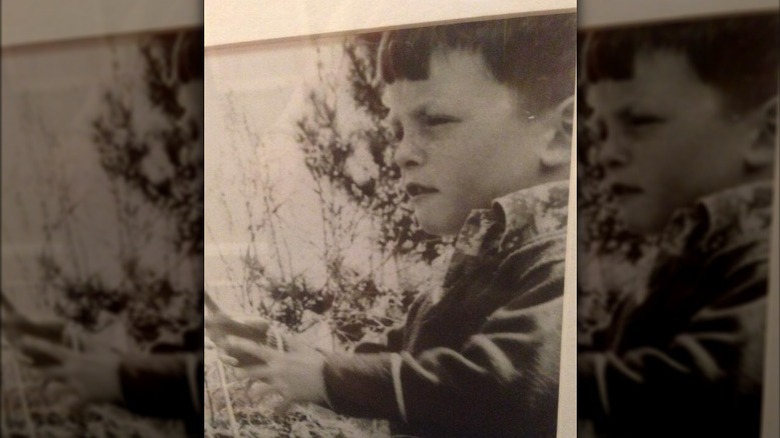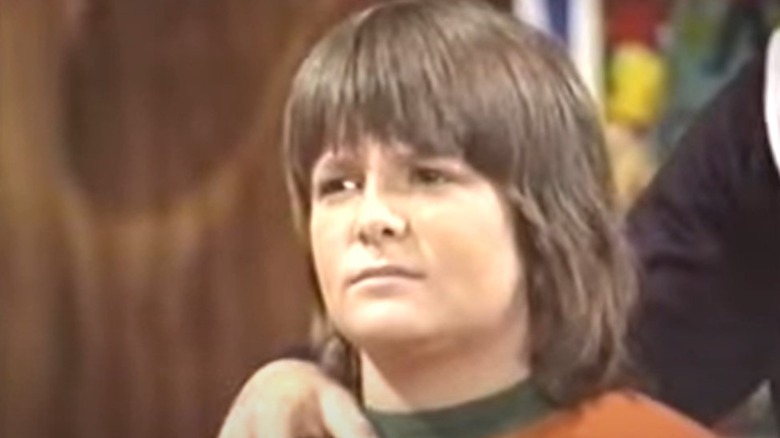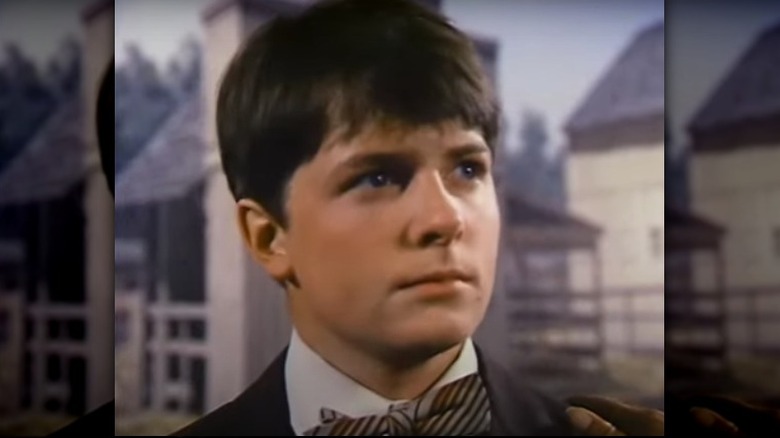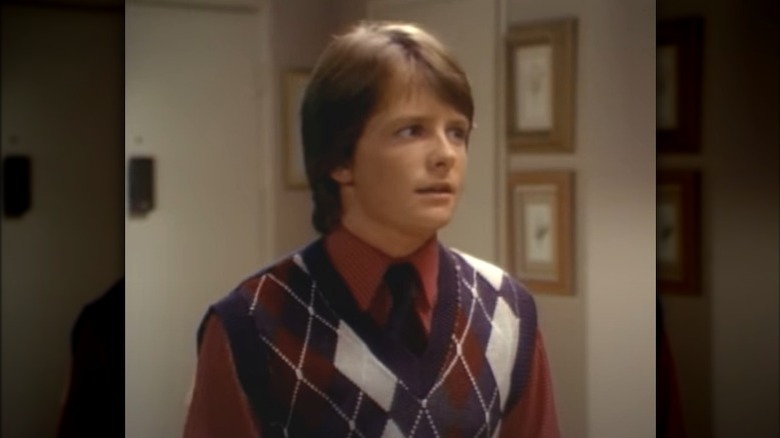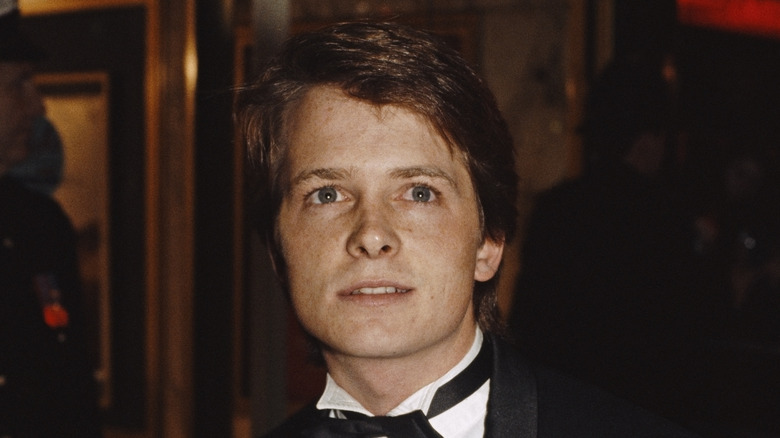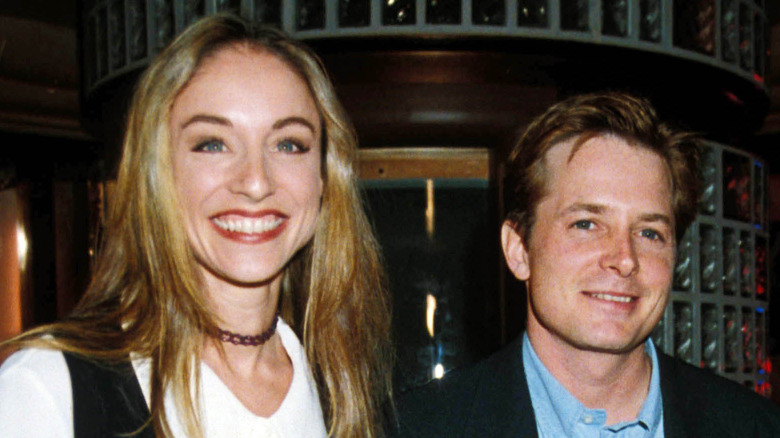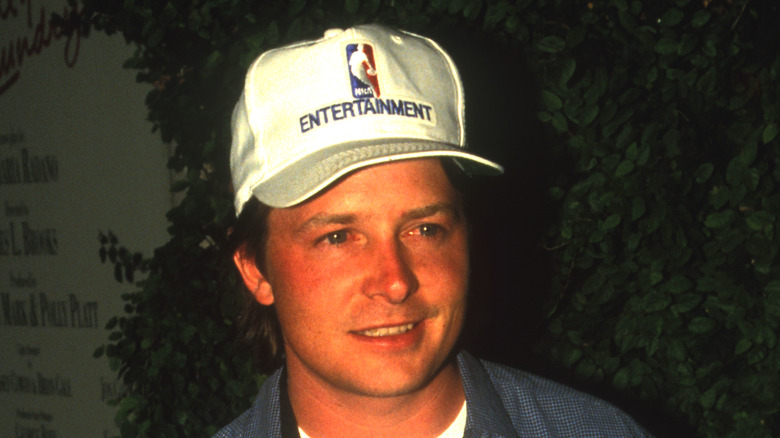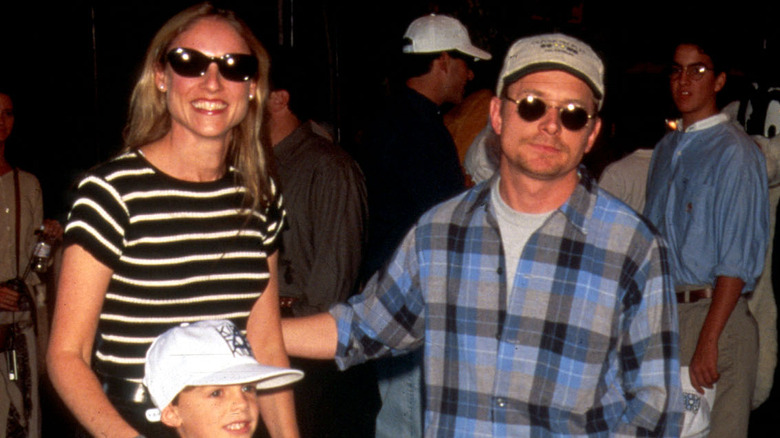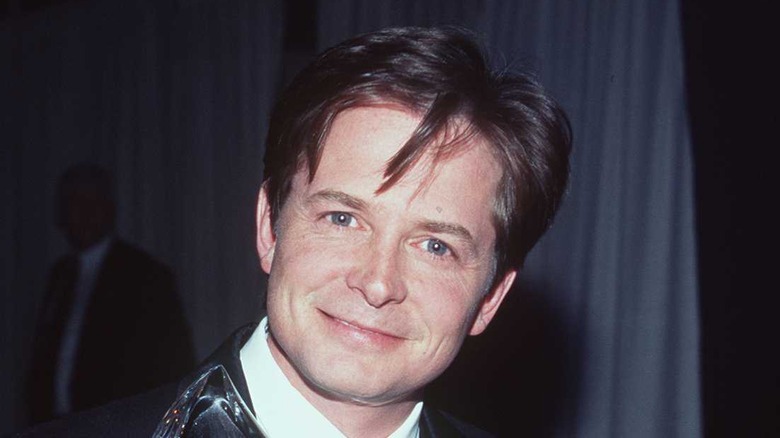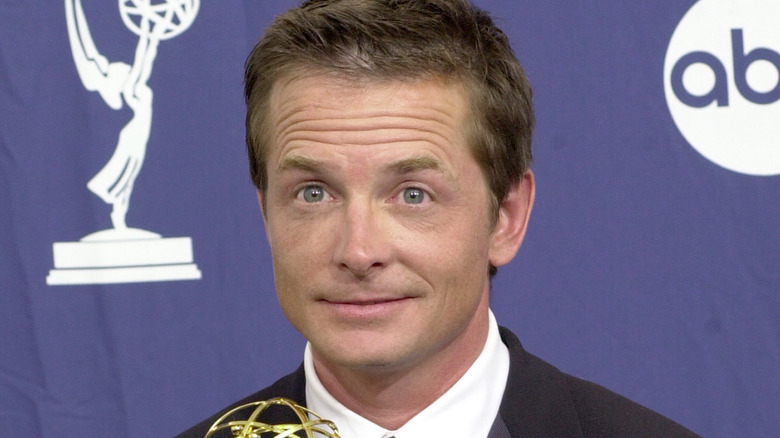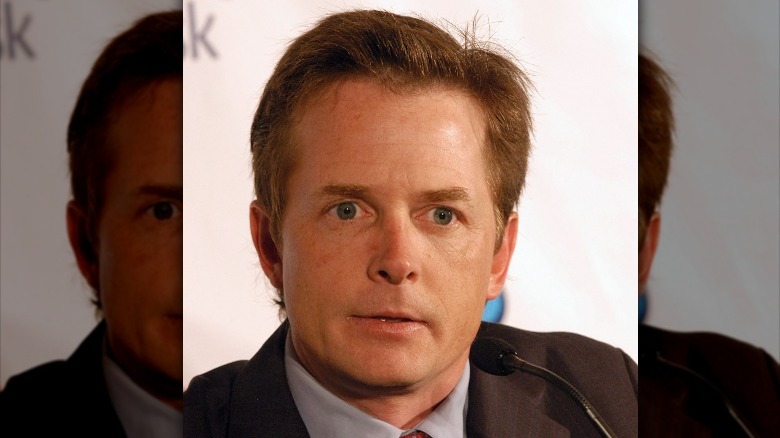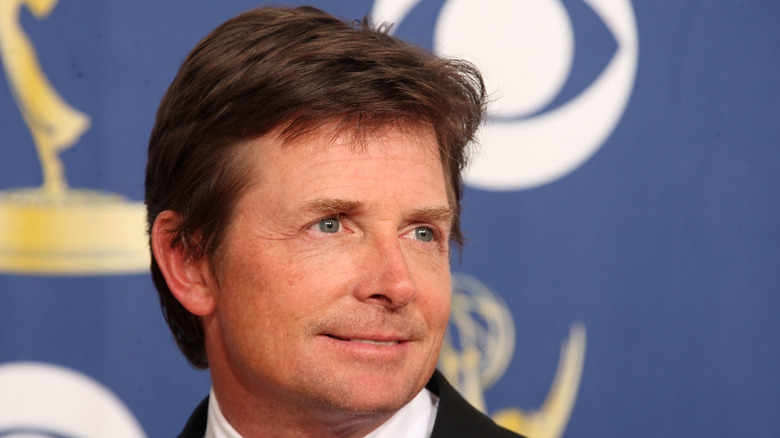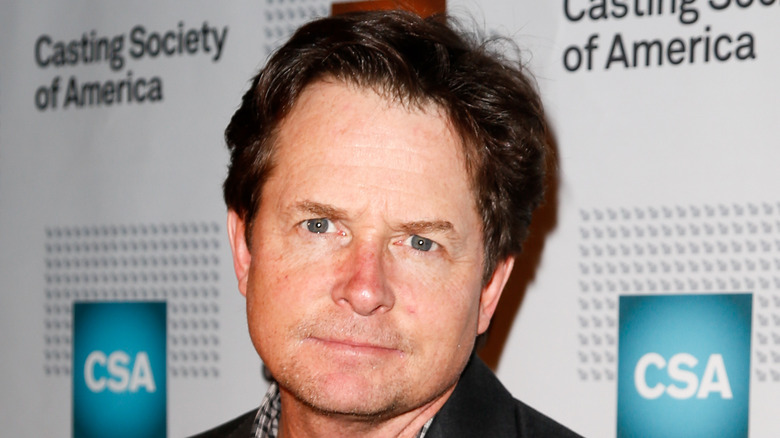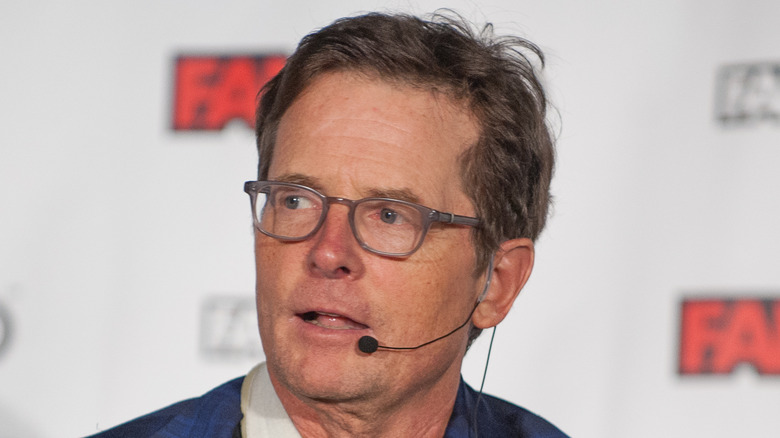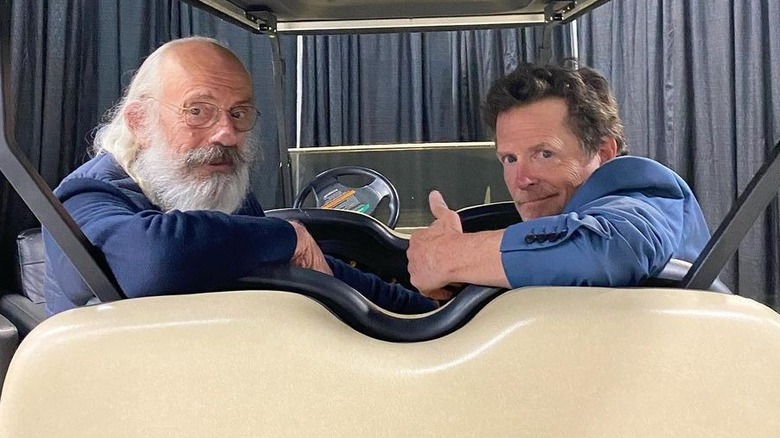The Transformation Of Michael J. Fox From 10 To 60 Years Old
Among the biggest stars of the '80s, Michael J. Fox is best known for his role in the "Back to the Future" trilogy. The original film was one of the best, if not the best, sci-fi movies of all time. It jumps between the year it was released, 1985, and 1955, while the 1989 sequel, "Back to the Future II," showed what the world could look like in 2015. It gave an eerily accurate prediction. Biff Tannen, the movie's corrupt villain, ruled the fictional town of Hill Valley after gaining political power. Screenwriter Bob Gale told The Daily Beast that the character was based on future president Donald Trump, and Fox noted the similarities between the two men. "Every worst instinct in mankind has been played on [by Trump], and for me that's just anathema. Biff is president!" he told The Guardian in 2020. The movie also featured futuristic Nike sneakers, which the footwear company ended up producing. Nike dropped its first version of the "Back to the Future" Mags in 2011. The release was in partnership with the Michael J. Fox Center for Parkinson's Research, which the actor founded in 2000 after he was diagnosed with Parkinson's disease at a young age.
Despite his health setback, Fox continued to act while pursuing a cure for Parkinson's through his philanthropic efforts. He also became an author, writing multiple memoirs about his incredible life full of fame, tragedies, and hope. Let's hop in the DeLorean to see the transformation of Michael J. Fox.
Inside Michael J. Fox's childhood
Michael J. Fox has something in common with entertainment stars Drake, Justin Bieber, and Ryan Reynolds: He's from America's northern neighbor. Fox was born in Edmonton, Canada in 1961. Though he grew up in Alberta's capital, he would call many places home during his father William's service with the Canadian Armed Forces. Fox considers himself an "army brat" whose family "moved several times during his childhood," according to his bio on the Michael J. Fox Foundation for Parkinson's Research page. In a 2017 interview with CBC, he recalled living "in places as far apart as Chilliwack, B.C. and North Bay, Ont." He added, "I crossed Canada a couple times before I was 10." After his father's 1971 retirement from the military, Fox, his parents, and his four siblings settled in Burnaby, British Columbia, not far from Vancouver. There, he started fifth grade at Morley Elementary School, per Burnabynow.
After becoming a successful star in Hollywood, Fox still never forgot his roots. He told CBC that being Canadian even helped his career as an actor because, as he put it, "You approach familiar things a different way; you come at it from a different angle." He further explained, "My reference for everything is my Canadian background, my life in Canada."
The actor had a difficult time at school
According to Michael J. Fox, he had a tough time in school as a teen. In the actor's memoir "A Funny Thing Happened on the Way to the Future," he admitted, "Throughout junior high, my academic grades continued to plummet." He revealed that he was an A student when it came to creative classes like writing, drama, and art. However, STEM-related courses like math and physics dragged his grade point average down. He seemed to reference this academic deficiency during a 2020 interview with The Guardian when he compared walking while struggling with the effects of Parkinson's to "a frigging math problem."
Fox became more disinterested in making good grades in high school — he joined a nearby theater company and shifted his focus to acting instead. "During much of the fall of 1978, I was going to school by day and performing at night in a long-running hit play at the Vancouver Arts Club," he wrote. He remembered often staying at the theater until after midnight, even on school nights. As a result, he admitted that he was only going "through the I'm-off-to-class motions" when he was supposed to be preparing to spend his day trying to improve those bad grades. Looking back on his one-minded focus, the actor revealed that he partly regretted his grade school experience. "I always felt that I came up short in the education department," he confessed during a 2010 NPR interview.
Michael J. Fox's big risk
In high school, Michael J. Fox remembered being "in the strange position of receiving solid reviews for my professional acting at the same time I was flunking high school drama for too many absences," he wrote in "A Funny Thing Happened On The Way To The Future." He told Rolling Stone that the specific reason he didn't pass the class was "because I wasn't there one day to put a bag over my head and crawl across the room backward, humming." He ultimately decided to drop out of school to pursue acting. While some were supportive of his decision, his social studies teacher had a different opinion. Fox recollected the teacher telling him that he was "making a big mistake" and warning him, "You're not going to be cute forever."
Though Fox's father had been critical of his poor academic performance, he still drove his son out to Los Angeles for a fresh start. Partly because he had dropped out of school himself in eighth grade, the actor's dad supported his career choice. He also understood that living in Hollywood would help Fox pursue his dream, telling him, "Hey, if you're going to be a lumberjack, you'd better go to the forest." The decision worked out well for Fox, but he still desired to properly close his high school career. A decade and a half after dropping out, he got his GED at the behest of his 4-year-old son, per NPR.
How he sort of went to college
While Michael J. Fox didn't take the traditional route of high school followed by college, he compared his move to California to pursuing higher education. In "A Funny Thing Happened On The Way To The Future," he revealed that he set himself a four-year goal to make it as an actor. He recalled how his early years in California "provided as intense an undergraduate experience as one would expect from any college career, replete with parties and heavy workloads." He also became close friends with three frat members at UCLA who lived in the apartment next door (via NPR). This allowed Fox to experience parts of college culture that he would have missed out on otherwise, like "free beer and college girls."
Fox was having fun socially but struggling to make ends meet. "I was getting all these great letters from collection agencies saying 'This is your last chance' in big red letters," he told The New York Times during a 1985 interview. Fortunately, he soon landed his breakthrough role as Alex P. Keaton in the TV sitcom "Family Ties." The actor said of his first big acting opportunity, "It's funny, because at a time when I was so low I would have taken any role, the role came around." In fact, he was so broke that he ended up negotiating his life-changing contract "from a phone booth in front of the Pioneer Chicken."
How Michael J. Fox joined Back to the Future
After growing in popularity on TV, Michael J. Fox made his transition to the big screen — thanks to another actor's shortcomings. The role of Marty McFly in "Back to the Future" originally went to Eric Stoltz, who was known for his role in "Mask." Stoltz had even started filming scenes for the soon-to-be-classic sci-fi adventure. But according to The New York Times, producers felt that he "was 'too intense' for the comic role of the young time traveler." As a result, Stoltz was fired from the film, and producers recruited Fox for the project.
The sudden change meant that Fox had to immediately start filming the movie while he was still busy working on "Family Ties." He confessed that holding down two acting jobs at once was difficult, and he called what happened to Stoltz "the actor's nightmare" during an interview with BBC host Barry Norman at the movie's premiere. But referencing the film's famous producer, he said to The New York Times, "How can you say no to Steven Spielberg?"
"Back to the Future" debuted in London in 1985, and even though it was his first time in a major motion picture, Fox still had no desire to see his work. "Call me cheap, but I wasn't ready to pay $5 to see myself on the screen," he told The New York Times at the time. According to the actor, he decided to wait until he returned to Los Angeles from London to see it.
How the Back to the Future star found his future wife
Few stars were hotter than Michael J. Fox in the late '80s. In addition to the first "Back to the Future" movie, the actor also starred in "Teen Wolf" in 1985. At one point, both films "held down the top two box-office spots," per The New York Times Magazine. Plus, he was still starring in the "top-rated" sitcom "Family Ties." The television series also introduced Fox to his future wife, actor Tracy Pollan. She joined the show to play Fox's on-screen girlfriend thanks in part to the actor himself. "Fox, after reading with five finalists, voted decisively for her," People reported in 1986. He said of his co-star, "Tracy had strength but she wasn't overbearing." In the beginning, both actors denied any speculation that they were involved in a real-life romance. Pollan lived on the East coast with her significant other at the time, Kevin Bacon, whom she expected to marry someday. However, she said of their relationship, "But I feel like we're kids still, and marriage is such a grown-up thing."
Fox also had marriage on his mind at the time thanks to his infatuated fans. He confessed to The New York Times in 1985, "I've gotten a lot of marriage proposals lately." He admitted of the admiration, "I'm not complaining." But by 1988, he and Pollan were husband and wife, per People. The couple went on to have four children together — son Sam, twins Aquinnah and Schuyler, and daughter Esmé.
Michael J. Fox's life changed in an instant
The future was looking bright for Michael J. Fox thanks to the outstanding success of the "Back to the Future" trilogy. According to People, the original film earned over "$300 million worldwide to become the top-grossing movie of 1985." As a result, Fox's salary increased "from $250,000 for the original to $5 million for each of the sequels." In 1989, he said of his career, "It's been a pretty busy 10 years. It's felt like 30." But after the trilogy concluded, Fox received terrible news that put his next ten years and beyond in doubt. According to his bio on the Michael J. Fox Foundation for Parkinson's Research website, Fox "was diagnosed with young-onset Parkinson's disease in 1991." He was just 29 years old.
"I was so scared. I was so unfamiliar with Parkinson's," Fox told The New York Times Magazine. Looking back on his reaction to receiving his diagnosis, the actor remembered the uncertainty of not knowing when the disease was going to get "bad," which completely changed his approach to his Hollywood career. Feeling what he called "time restrictions or financial pressures," he admitted that he looked to choose quantity over quality in terms of picking his next movies. But reflecting back, he said, "It shouldn't have been to do as many quick successful ones as I could. It should've been to do as many good ones as I could."
The actor kept his health status a secret
In addition to his sci-fi work, Michael J. Fox starred in a variety of other films, including "Doc Hollywood," "Casualties of War" with Sean Penn, and the Walt Disney tear-jerker "Homeward Bound: The Incredible Journey," per IMDb. Then, following a string of unmemorable performances on the big screen, Fox returned to scripted television — the medium that first made him a star. Starting in 1996, he played New York City's Deputy Mayor Michael Flaherty in the ABC series "Spin City." The comedy, co-created by Bill Lawrence, who later helped create "Scrubs" and "Ted Lasso", was a huge success. The role was perfect for Fox, who earned "critical praise as well as plenty of hardware, garnering three Golden Globe Awards, one Emmy Award, three Emmy nominations, a GQ Man of the Year Award in the TV comedy category, a People's Choice Award and two Screen Actors Guild Awards," per his "Back to the Future" bio.
Behind the scenes, Fox was dealing with his Parkinson's disease diagnosis. According to the actor, the initial shock caused confusion about how to best balance his health and his acting career. He told The New York Times Magazine that it took about three years from initially learning about his diagnosis to accepting his health situation. He explained, "Acceptance doesn't mean resignation. It means understanding and dealing straightforwardly. When I did 'Spin City,' I started to do that."
A huge decision for Michael J. Fox
Michael J. Fox continued to act while his health deteriorated from Parkinson's disease, but he kept the fact a secret from the public for years. The actor told The New York Times Magazine that he could hide his health issues somewhat by incorporating "high-level muggery." He elaborated, "I could pull a face; I could do a double take."
But in 1998, seven years after first receiving his diagnosis with Parkinson's, he announced that he was living with the disease. That March, he "underwent brain surgery," as reported by The New York Times. The goal of the procedure was to alleviate some of his symptoms, which included "stiffness and tremors in his left side." The actor joked that the tremors were so big that he "could mix a margarita in five seconds." With his secret out, Fox vowed to continue his work in entertainment post-surgery. His agent said that the then-37-year-old actor would be capable of "working on 'Spin City,' future projects and personal commitments for many years."
Looking back on his announcement, Fox revealed that part of the reason he shared his health news with the world was due to a lack of privacy. "The paparazzi and stuff, they would stand outside my apartment and heckle at me, like, 'What's a matter with you?'" he recalled during an October 2021 ET interview. Per Fox, he remembered thinking, "'I can't be making my neighbors deal with this,' so I came out, and it was great. It was a great thing."
He quickly un-retired
At the start of the new millennium, Michael J. Fox announced his retirement from "Spin City." According to the actor, one of the reasons he decided to step away was due to increased physical difficulties. He spoke to The New York Times Magazine about his later years in the series, saying, "I felt my face hardening. My movements were constricted." He added that while filming, "I would anchor myself against a desk or the wall. Eventually it was too burdensome. So I left."
As recapped on his bio for the Michael J. Fox Center for Parkinson's Research, which he founded in 2000, Fox wanted to ceremoniously leave "upon the completion of his fourth season and 100th episode" of the sitcom. The actor announced that his health issues and "new priorities made this the right time to step away from the demands of a weekly series." While speaking to The New York Times after founding his research foundation, Fox said, "Not in any way do I think I'm bringing any kind of great intellect or insight to Parkinson's." Instead, he hoped to use his celebrity status to bring awareness to the cause, in addition to learning more about the disease himself. Twenty years later, his foundation would be one of the leaders in helping people affected by the disease. As of 2020, it "has funded more than $1 billion in Parkinson's research," The New York Times reported.
Michael J. Fox is a sitcom veteran
Following Michael J. Fox's departure from "Spin City," Charlie Sheen joined the series to replace his character. However, Fox stayed involved in the show through his role as an executive producer until it ended in 2002, per The New York Times Magazine. While it appeared that he may have stepped away from acting for good, he returned a few years later on the medical comedy "Scrubs." Reflecting on his time with Zach Braff and the other fake doctors, he admitted, "I don't think I was very good in it, but I enjoyed being back on set." Even though Fox was humble about his performance as a doctor with obsessive-compulsive disorder, critics loved his character on the show. "He makes the guy funny and touching without being a lick sentimental," the Chicago Tribune wrote. Screen Rant further praised Fox by deeming him the "greatest guest star" on the entire series over other big stars like Brendan Fraser and the late John Ritter.
Following "Scrubs," Fox appeared in the series "Boston Legal." He recalled smelling "the arclight" while on the set of the drama. "Something about that smell made me think, Acting is what I do. And I needed to find a way to do it with my new instrument," he told The New York Times Magazine. With his reignited passion for acting, Fox found he could best play his roles using a "less is more' philosophy" for performing.
How the actor balanced his heath and career
Over a decade after announcing his diagnosis with Parkinson's disease, Michael J. Fox was still proving that he was one of the best actors around. In 2009, he guest-starred on the FX drama "Rescue Me." For his portrayal of the "embittered, drug-addicted Dwight," Fox won his fifth Emmy award, according to his Michael J. Fox Center for Parkinson's Research bio. The following year, Fox joined the TV series "The Good Wife." In the series, he played Louis Canning, an attorney "who used his tardive dyskinesia to his clients' advantage." He was once again captivating on-screen, and he continued the role from 2010 to 2016. He stepped back into the character's shoes in 2020 for the spin-off series "The Good Fight."
One of the most impressive aspects of all Fox's acting work during these years was how he dealt with the unpredictability of his disease. According to The Guardian, he wouldn't know "when his daily meds will kick in" to help lessen his symptoms. Reportedly, he could easily become "'akinetic', seized by tremors and stiffness." Alternatively, he could also become "'dyskinesic', sending him 'rocking, dipping, diving.'" But through all the tough days, Fox continued to stay positive. In 2009, he followed up his 2003 best-selling memoir "Lucky Man" with his second book, "Always Looking Up: The Adventures of an Incurable Optimist." Plus, Fox continued to advocate for research on Parkinson's, even once appearing "unmedicated before Congress, to illustrate the terrible effects of the disease," per The Guardian.
A surprising failure for Michael J. Fox
Though he was performing well in other sitcoms, Michael J. Fox wanted to help create a series about his day-to-day experiences. So in 2013, he became the star of "The Michael J. Fox Show." In the sitcom, he portrayed a news anchor with Parkinson's disease. Unfortunately, the show didn't connect with audiences, and it ended the year after it premiered. Reflecting back on why it didn't work, Fox admitted to The New York Times Magazine, "I didn't have the energy to keep the show on the track that I'd set it out on." The actor felt like many people involved with the series didn't realize that its premise and the reality of Parkinson's were the same. "This is probably unfair but I feel like one day they woke up and said, 'Oh, he really has Parkinson's.' Like somebody saw me tremoring in rehearsal and said, 'What's wrong with him?' he said.
Fox also seemed to find it difficult to portray his real-life interactions with his family members in a manner that others unfamiliar with the disease would understand. He credited those closest to him who would "give me [expletive] all the time" for not denying him his "humanness." Fox explained that his true intent with the show was to not make fun of the disease but rather to show how people deal with adversity. Unfortunately, instead of translating his highs and lows with Parkinson's to a sitcom format, Fox confessed, "We lost that voice and I blame myself."
He faced multiple setbacks
In 2018, Michael J. Fox started a limited run on the TV series "Designated Survivor" starring Kiefer Sutherland. It was a reunion for the two actors, who were both leads in the movie "Bright Lights, Big City," which came out three decades earlier. Speaking about what it was like having the big '80s stars back together, one of the show's actors and directors, Timothy Busfield, told TV Insider, "It was great watching two old friends with such history play off of each other." In his opinion, Fox and Sutherland "clearly loved each other from their experiences decades ago."
As if dealing with the effects of Parkinson's disease wasn't difficult enough, Fox sadly faced another health setback in 2018 when he had to undergo surgery for a recurring spinal cord issue. "I was told it was benign but if it stayed static I would have diminished feeling in my legs and difficulty moving," he told The New York Times Magazine. Fox said his breaking point came when he suddenly "started falling" so much that "It was getting ridiculous." But things were looking up again post-operation, with the actor successfully completing physical therapy. Then disaster struck. "I woke up, walked into the kitchen to get breakfast, misstepped and I went down. I fractured the hell out of my arm. I ended up getting 19 pins and a plate," Fox recalled. Before the accident, he had decided "to do some acting," but the injury "was such a blow" to his progress.
Going back to the future with Michael J. Fox
Prior to the beginning of the COVID-19 pandemic, Michael J. Fox began drafting his fourth memoir. Once people started to quarantine, he decided to hole up with his family in Quogue, New York, per The New York Times. However, the upheaval didn't stop his progress — in fact, he and "his longtime producing partner, Nelle Fortenberry," used the magic of video chat to "work six days a week" on his memoir. "He talks and I type," Fortenberry said. "I am not his ghostwriter or a co-writer." Before the end of 2020, Fox released "No Time Like the Future: An Optimist Considers Mortality."
That same year, Fox reprised his role as Marty McFly in a teaser trailer for Lil Nas X's "Holiday" music video. Dressed in a Western outfit similar to the one he wears in "Back to the Future III," Fox warns Lil Nas X to not visit the future year of 2020. The actor revealed on "The Late Late Show with James Corden" that Lil Nas X reached out to him for the cameo. Fox's kids were fans of the musician and told their dad, "You have to do this," according to the actor. The video also saw him reunite with his on-screen best friend from the trilogy, Doc Brown (Christopher Lloyd). In an Instagram photo posted by Fox, he is sitting with Lloyd, and both men are smiling back at the camera. "Back to back," Fox captioned the picture.

